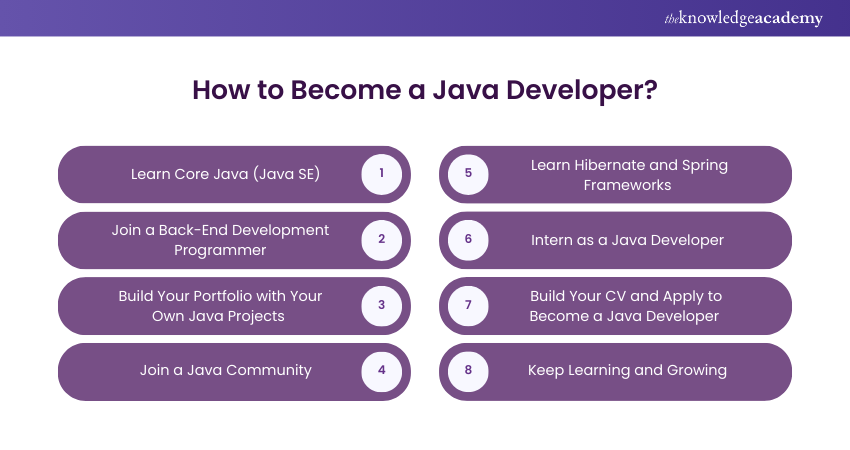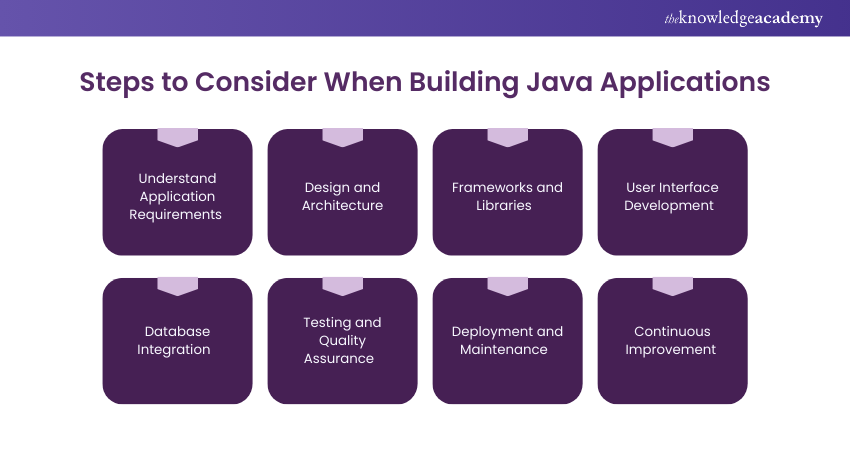We may not have the course you’re looking for. If you enquire or give us a call on +34 932716793 and speak to our training experts, we may still be able to help with your training requirements.
Training Outcomes Within Your Budget!
We ensure quality, budget-alignment, and timely delivery by our expert instructors.

Learning How to Become a Java Developer opens a world of opportunities in Software Development. Java is a versatile and widely used programming language known for its reliability, scalability, and platform independence. Beginners looking to start a career in programming can often feel confused about how to approach this process.
If you're interested in creating powerful software and applications using one of the popular Programming Languages, you're in the right place. In this blog, we discuss "How to Become a Java Developer," breaking down the essential steps and gaining real-world experience. This helps you navigate the path to a successful career as a Java Developer. Let's get started!
Table of Contents
1) What is Java Development?
2) Who is a Java Developer?
3) How to Become a Java Developer?
4) Building Real-world Java Applications
5) Conclusion
What is Java Development?
Java Development involves writing code in the Java Programming language to create applications that run on different platforms, including desktops, mobile devices, and embedded systems. Java's object-oriented nature allows developers to build modular and reusable code, promoting code organisation and maintainability.
The Java Virtual Machine (JVM) enables platform independence, making Java applications compatible with multiple Operating Systems. Java Development offers a wide range of tools, libraries, and frameworks that simplify application development and enhance productivity.
Who is a Java Developer?
A Java Developer is a Programmer who specialises in writing software and applications using the Java Programming Language. They are responsible for designing and developing Java-based applications, ensuring they run smoothly and efficiently.
Java Developers work on various projects, from web and mobile apps to enterprise systems, using their skills to solve problems and build solutions in Java. They also collaborate with other developers and teams to create quality software that meets user needs.
How to Become a Java Developer?
Becoming a Java Developer involves a series of steps that will help you gain the necessary skills and experience:

1) Learn Core Java (Java SE)
Start by diving into the basics of Core Java, which is the foundation of the Java Programming Language. Focus on understanding key concepts like variables, data types, operators, control structures, and object-oriented programming principles. It's important to grasp how classes, objects, inheritance, polymorphism, and encapsulation work in Java.
Practice writing simple programs to reinforce your understanding of these concepts. Utilise online tutorials, video courses, and books to guide your learning process. Mastering Core Java is essential before moving on to more advanced topics and frameworks.
2) Join a Back-End Development Programme
To further your knowledge, consider joining a structured back-end development program. These programs typically cover server-side programming, databases, Application Programming Interfaces (APIs), and how to build scalable applications using Java. You learn about interacting with databases using Java Database Connectivity (JDBC), handling requests and responses, and managing server configurations.
Such programs often include hands-on projects, which help you apply the concepts you’ve learned in real-world scenarios. It also provides a structured learning that ensures you cover all essential topics.
3) Build Your Portfolio with Your Own Java Projects
Start creating your own Java projects to demonstrate your skills and gain practical experience. Choose projects that interest you, such as building a Web Application, a mobile app, or a desktop tool. As you develop these projects, you encounter challenges that will deepen your understanding of Java and problem-solving techniques.
Document your projects well, including writing clear code, adding comments, and creating user guides or documentation. A well-organised portfolio showcasing a variety of projects will impress potential employers and clients. Sharing your projects on platforms like GitHub can also help you get feedback and improve your coding skills.
4) Join a Java Community
Engaging with a Java community can significantly accelerate your learning and keep you motivated. These communities, whether online or local, are filled with other Java Developers who share their knowledge, experiences, and resources. Participating in forums, attending meetups, or joining coding challenges can help you learn about Java trends and best practices.
You can also ask questions, share your own insights, and collaborate on projects with others in the community. Additionally, networking within these communities can lead to job opportunities and valuable connections in the industry.
5) Learn Hibernate and Spring Frameworks
Hibernate and Spring are two of the most important frameworks in Java Development, and learning them is crucial for advancing your career. Hibernate simplifies database interactions by providing an Object-relational Mapping (ORM) framework, allowing you to work with databases using Java objects.
Spring, on the other hand, is a framework that simplifies the development of enterprise-level applications by providing tools for dependency injection, aspect-oriented programming, and more. Start by understanding the basics of each framework, and then build small projects to practice using them.
These frameworks are widely used in the industry, so familiarity with them will make you a more competitive job candidate.
6) Intern as a Java Developer
Gaining practical experience through an internship is one of the best ways to transition from learning to working in the industry. As an intern, you have the opportunity to apply your Java skills in a real-world setting, working on projects that have tangible outcomes. You learn how to work within a team, follow development processes, and meet project deadlines.
Internships also expose you to the day-to-day challenges of a Java Developer, such as debugging, optimising code, and collaborating with other teams. This experience is invaluable when it comes time to apply for full-time positions. Additionally, internships often lead to job offers, providing a pathway to starting your career as a Java Developer.
7) Build Your CV and Apply to Become a Java Developer
Once you’ve built a solid foundation in Java and gained practical experience, it’s time to craft a compelling CV. Highlight your technical skills, including your proficiency in Core Java, any frameworks you’ve mastered, and the projects you’ve completed. Include details about your education, any certifications you’ve earned, and internships or work experiences.
Tailor your CV for each job application, emphasising the skills and experiences that are most relevant to the position. With a strong CV and portfolio, start applying for Java developer positions and prepare for interviews by practising coding problems and reviewing key Java concepts.
8) Keep Learning and Growing
The field of software development is always evolving, and staying up-to-date is crucial for long-term success. Even after you’ve landed a job as a Java Developer, make it a habit to continuously learn new skills and technologies. Follow industry blogs, attend webinars, and read books to stay informed about the developments in Java and software engineering.
Explore advanced topics such as microservices, Cloud Computing, and DevOps, which are becoming increasingly important in the industry. Regularly update your portfolio with new projects that showcase your growing skill set. By committing to lifelong learning, you not only advance your career but also keep your work exciting and fulfilling.
Develop an understanding of JavaScript with our JavaScript for Beginners Course – Join today!
Building Real-world Java Applications
Building real-world Java applications is an exciting and rewarding endeavour that allows you to apply your Java programming skills to create practical solutions for various industries and domains. Here are the key steps to consider when building real-world Java applications:

Understand Application Requirements
Start by understanding the needs of the application you intend to build. This includes gathering information about the features, functionality, user expectations, and any constraints or limitations.
Design and Architecture
Plan the structure and architecture of your Java application. Identify the key components, modules, and their relationships. Utilise design principles and patterns, such as Model-View-Controller (MVC) or Service-Oriented Architecture (SOA), to ensure a clean, scalable, and maintainable codebase.
Frameworks and Libraries
Leverage Java frameworks and libraries to expedite development and enhance the functionality of your application. Frameworks like Spring, Hibernate, and JavaFX provide robust tools and features for building web, enterprise, and desktop applications. Utilise libraries for specific functionalities like data manipulation, networking, or user interface development.
User Interface Development
Design a user-friendly interface for your application. Utilise Graphical User Interface (GUI) libraries like JavaFX or Web Development frameworks like JavaServer Faces (JSF) or Spring MVC to create interactive user interfaces. Pay attention to usability, responsiveness, and accessibility aspects.
Database Integration
Incorporate database functionality into your Java application. Use Java Database Connectivity (JDBC) or Object-Relational Mapping (ORM) frameworks like Hibernate to interact with relational databases, store data, and retrieve information. Design an appropriate database schema and implement efficient data access strategies.
Testing and Quality Assurance
Implement comprehensive testing strategies to ensure the reliability and functionality of your application. Utilise unit testing frameworks like JUnit or TestNG to write automated tests that verify the correctness of individual components. Perform integration testing to ensure proper communication and functionality between different modules. Additionally, user acceptance testing must be conducted to validate the application's behaviour against the intended requirements.
Deployment and Maintenance
Prepare your application for deployment by packaging it into executable files or deploying it to cloud platforms. Consider containerisation using technologies like Docker for improved portability and scalability. Establish maintenance processes to handle bug fixes, updates, and improvements throughout the application's lifecycle. Monitor the application's performance and user feedback to continuously enhance its functionality.
Continuous Improvement
Keeping up with the latest trends, development practices, and framework advancements in the Java ecosystem is vital for a successful development career. Continuously enhance your skills by exploring new technologies, frameworks, and best practices. Engage with the Java Developer community, participate in online forums, attend conferences, and join coding communities to collaborate with fellow developers.
Learn how to make desktop applications with our Java Swing Development Training – Join today!
Conclusion
Understanding How to Become a Java Developer involves learning Core Java, joining a back-end development program, and building a strong portfolio through hands-on projects. By mastering essential frameworks like Hibernate and Spring and gaining real-world experience through internships, you can build a successful career. Keep learning and growing to remain competitive in the field. With dedication and persistence, you’ll be well-equipped to become a skilled Java Developer.
Learn the basics of programming with our Java Programming Course – Join today!
Frequently Asked Questions

Becoming a Java Developer can be challenging, especially if you're new to programming, but with dedication and consistent practice, it’s definitely achievable. The key is to start with the basics, build your skills gradually, and apply what you learn through real projects.

Although having a formal education in computer science or a related field can be helpful, it's not strictly necessary to become a Java Developer. Many developers are self-taught or have completed coding boot camps; what's most important is your ability to demonstrate your skills.

The Knowledge Academy takes global learning to new heights, offering over 30,000 online courses across 490+ locations in 220 countries. This expansive reach ensures accessibility and convenience for learners worldwide.
Alongside our diverse Online Course Catalogue, encompassing 19 major categories, we go the extra mile by providing a plethora of free educational Online Resources like News updates, Blogs, videos, webinars, and interview questions. Tailoring learning experiences further, professionals can maximise value with customisable Course Bundles of TKA.

The Knowledge Academy’s Knowledge Pass, a prepaid voucher, adds another layer of flexibility, allowing course bookings over a 12-month period. Join us on a journey where education knows no bounds.

The Knowledge Academy offers various Java Trainings, including Java Programming Course, JavaScript for Beginners Course and Java Swing Development Training. These courses cater to different skill levels, providing comprehensive insights into Java Developer Job Description.
Our Programming and DevOps Blogs cover a range of topics related to Java, offering valuable resources, best practices, and industry insights. Whether you are a beginner or looking to advance your Java Programming skills, The Knowledge Academy's diverse courses and informative blogs have you covered.
Upcoming Programming & DevOps Resources Batches & Dates
Date
 Java Programming
Java Programming
Mon 20th Jan 2025
Mon 3rd Mar 2025
Mon 12th May 2025
Mon 14th Jul 2025
Mon 22nd Sep 2025
Mon 17th Nov 2025







 Top Rated Course
Top Rated Course



 If you wish to make any changes to your course, please
If you wish to make any changes to your course, please


